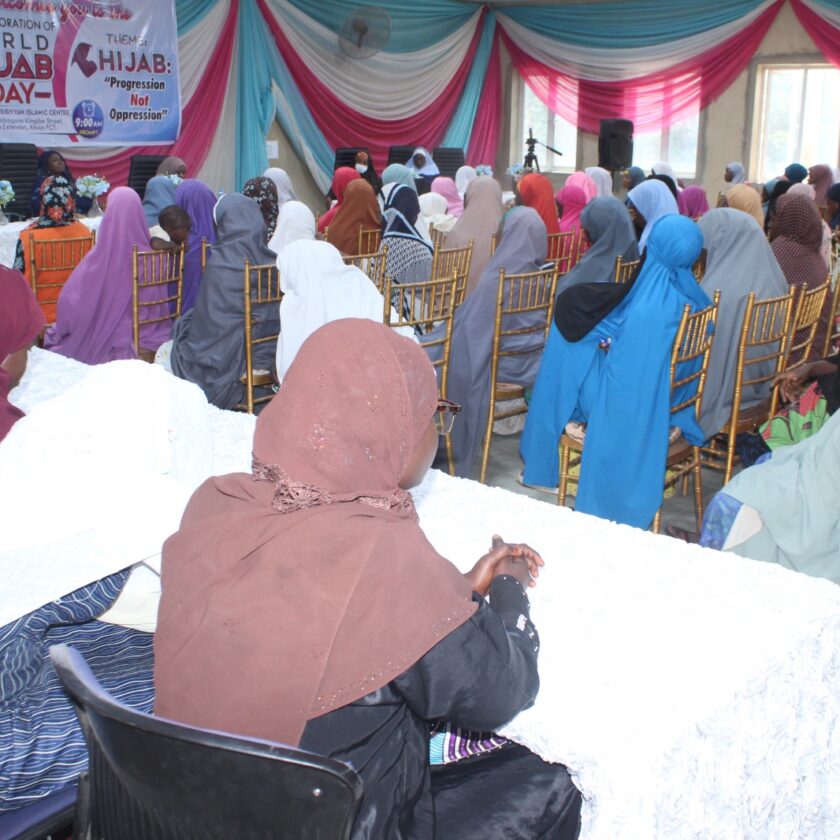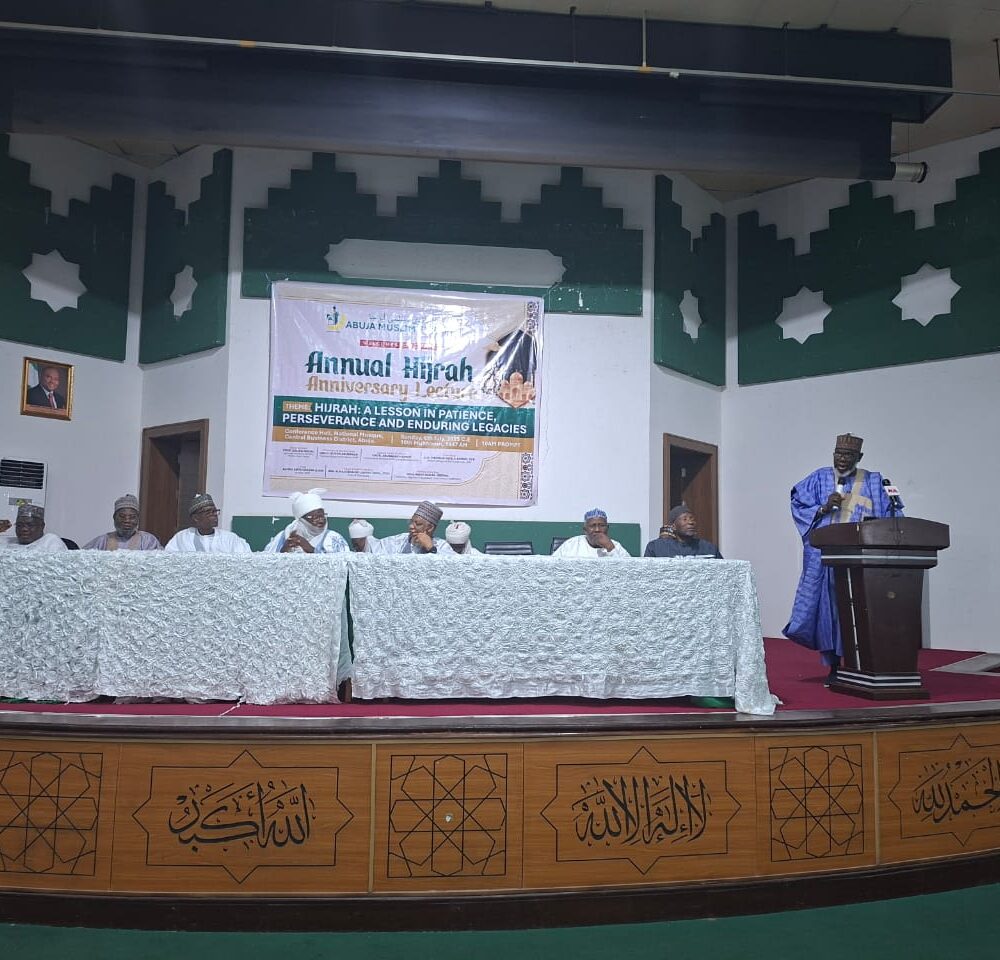In the name of Allah, the Most Gracious, the Most Merciful
All praise is due to Allah, the Lord of the Worlds. Peace and blessing be upon whom Allah sent as a mercy to the Worlds, upon his Family, his Companions and his Brothers till the Day of Resurrection.
Dear brothers and sisters, as you all know, some Nigerian youth mostly from southern parts of Nigeria have been demonstrating, as they claimed, against the use of excessive force, harassment, extortion and extra-judicial killings by the Special Anti-Robbery Squad (SARS) of the police, but actually their actions are totally political, and it is a plot to destabilise Nigeria.
The demonstrations and social media campaign have drawn attention and support across the world and forced the government to announce the scrapping of the unit and created the Special Weapon and Tactics (SWAT) to take its place.
However, protesters have refused to back down because of their political agendas and ambitions.
The protesters have issued a five-point demand which includes the release of all persons arrested and justice for victims of police brutality, an independent body to oversee the investigation and prosecution of all reports of police misconduct and psychological evaluation of all disbanded SARS officers before their redeployment.
They also demanded an increase in the salary of police officers and general improvement in their welfare package to enhance the discharge of their duties.
Fellow Nigerians, a protest is any action an individual or group may take to draw attention to an issue or cause in which they believe. Protests usually arise when people feel an injustice has occurred.
People protest against injustice in many different ways. This ranges from writing letters, boycotting products and joining protest groups to even breaking the law and going to prison. People may decide on some kind of public protest because they feel they have no other way to make their voices heard. It is a way to attract media attention and make other people aware of the issue. Protestors may think that it is right to stand up for what they believe. Sometimes people may believe that it is the only way to bring about change or correct something that is wrong.
Non-violent protests involve methods of protesting that do not cause harm to others or damage to property. These can be simple actions such as signing a petition, writing to a leader or opting not to buy goods and services from a particular company or country. Other forms of non-violent protests may involve more direct action: street marches, sit-ins (occupying a building or space), refusing to work such as strike action or causing disruption such as blocking roads. These actions can be frustrating for individuals and companies who are affected by protests, but no direct physical harm to people is caused.
Some protestors feel that non-violent actions such as these are not enough. They believe that the only way their concerns will be heard is if they use more extreme forms of protest. This can include methods that are intended to intimidate others and force change, as what is taking place in Nigeria today. They believe direct violence against the section of the country or against others and property will change public opinion. However, this change may only be achieved due to fear of violence, not because the people necessarily agree.
• The Islamic viewpoint of protest
Respected brothers and sisters, know that, as Muslims, we must be guided by the teachings of Qur’an and Sunnah in all our activities from the mundane to the most serious. Allah’s Messenger (Peace be upon him) taught his Ummah (nation) every affair that would bring them closer to success in this life and Paradise in the next, and he warned them from every affair that would harm them and bring them closer to Hell.
When a Muslim sees injustice, he has been guided by the revealed texts to act appropriately. The Prophet Muhammad (Peace be upon him) said:
“Help the oppressed and the oppressor.”
When it was said to him that it is correct that the oppressed should be helped, but how does one help the oppressor?!
He responded:
“Stop him and prevent him from oppression, and that is helping him.”
He also said:
“Whoever among you sees an evil, let him stop it with his hand. If he is not able, let him stop it by speaking. If he is not able, let him at least hate it with his heart for that is the weakest of faith (Iman).”
However, there are some mighty principles that go along with these Prophetic narrations to avoid anarchy, chaos and disorder in societies. For example, if one’s mother and father are involved in drinking wine or smoking and gambling, it is not permitted to physically assault them or to harm them under the guise that one is forbidding evil!
Another example is that if a burglar breaks into one’s house, it is not permissible to pursue him and imprison him in a homemade prison or carry out the prescribed punishment upon him. Islam prohibits us to take the law into our hands!
On the other hand, a father and mother may physically withhold their children from taking drugs, stealing or smoking, by rebuking them. Likewise, a leader and his appointed courts may sentence criminals and punish them because they have an Islamic duty to do so. Many Muslims and non-Muslims misunderstand the Islamic texts and think that any person can do whatever they wish to correct wrongs in society by “any means necessary.” Wallahi this is wrong and in contradiction to other explanatory texts.
The Messenger of Allah (Peace be upon him) said:
“If one of you sees something from the leader that he hates, let him not publicise it.”
This is a clear Hadith forbidding openly protesting (even publicly speaking) against the leader. Then he gave the Muslims a method of correcting the leader. He said:
“Rather you should take the leader by his hand and advise him. If he accepts the advice, then that is good. If he refuses, then you have fulfilled your duty.”
In another narration, he (Peace be upon him) said:
“The martyr is the one who speaks a word of truth in the presence of the tyrannical leader for which he is killed.”
These authentic narrations make it very clear that the leader should only be advised in his presence and NOT in public. So, one may write to the leader with gentle words advising him with correct conduct. The Messenger of Allah (Peace be upon him) never ever protested in the streets of Makkah or Madinah though he and his companions were oppressed and persecuted for 13 years in Makkah. They never once blocked the streets, participated in protests or sit-ins, or plotted assassinations. However, the Prophet Muhammad (Peace be upon him) would constantly advise them and remind them of their duty to their Lord and the impending Day of Judgement wherein Allah would call them to account.
So to oppose this methodology is to oppose the Prophet Muhammad (Peace be upon him) as he himself said:
“Whoever turns away from my Sunnah is not from me.”
He also said:
“You will have leaders over you who will not follow my Sunnah, nor my guidance. There will be amongst them men who will have the hearts of devils in the bodies of humans.”
When asked how one is to behave towards such oppressive leaders, he responded:
“Listen and obey the leader, even if he takes your wealth and beats you in your back. Listen and obey.”
So patience is very important in times of hardship. There is tremendous wisdom behind this because of the great bloodshed and anarchy that results in standing up against those in authority. Furthermore, it is a reminder that people are only ruled by those they deserve and the leaders are merely a reflection of society. So Allah gives good people a good leader and wicked people a wicked leader as the great scholars such as Imams Ibnul-Qayyim, Ibn Baz and Al-Albani have stated. So protests, demonstrations, civil-disobedience and rising up against the leaders and those in authority are not allowed in Islam.
As for the duty of forbidding evil and how it is to be carried out, then the principle is as follows:
1. Forbidding evil with the hand is for the leaders and those in authority such as the courts and the police appointed by the leader.
2. Forbidding evil with speech is for the scholars and those with knowledge (and not pretenders who claim they know!).
3. Hating evil with one’s heart is for everyone to whom the truth has reached from the general folk.
As for boycotting products and goods, then one should only do so if the leader has commanded with that or the great scholars with the authority given to them by the leaders. Writing to advise the oppressive leader should be done in private whilst showing gentleness and concern, free from rude and wicked speech. Also one may approach a government minister or a scholar who can in turn advise those in authority. A worker may approach his employer directly, or complain to the leaders in government about mistreatment. This is the balanced and orderly method of rectification whilst maintaining patience and supplicating to Allah (Du’a).
One can see the evil effects of following a methodology that opposes the Qur’an and Sunnah in the “Arab Spring” which began in Tunisia (in 2011) with an Islamically forbidden act of suicide (a man burned himself alive as an act of protest) and then these protests spread to Egypt, Libya, Syria, Yemen, Sudan, Mali and other countries that resulted in anarchy, mass killing of civilians and the general collapse of societies.
Some Muslims were deceived into thinking they were doing a religious act approved of by the Qur’an and Sunnah. Since then, hundreds of thousands have died (and continue to do so), millions are homeless, schools and hospitals are bombed, and thousands imprisoned. Knowledgeable Muslims say:
“This is a clear proof that abandoning the guidance of the Prophet Muhammad (Peace be upon him) and resorting to direct public protests only brings about greater harm.”
One can see the many terrorist groups have arisen in the wake of the “Arab Spring” such that no right-minded person looks upon those protests except with sadness and regret. And let us not forgot that these protests were condoned, justified and supported by many “liberals”, “secular” and ignorant Muslims. Wallahul Musta’an!
Dear brothers and sisters, there is a narration some ignorant Muslims political agitators rely on and utilise to support the permissibility of protests and street demonstrations: That which is ascribed to Umar Bin Al-Khattab (may Allah be pleased with him) that when he embraced Islam, he said to the Messenger of Allah (Peace be upon him):
“By the One who sent you with the truth, we will indeed go out [and make our Islam apparent]. So we went out in two rows, Hamza in one, and myself in the other, with dust rising from the ground until we entered the Mosque. Quraish gazed at me and at Hamzah― and they were struck with depression the like of which they had never experienced before.”
Dear brothers and sisters, this narration is often quoted because it is mentioned by the author of “Ar-Rahiq Al-Makhtum”, who in turn referenced it from Ibn Al-Jawzi who cited it in his “Tarikh Umar Bin Al-Khattab, page 6-7.” For many years, some ignorant people have quoted this narration and claimed that it is a proof for protesting against the leaders. So, let us discuss the narration from the viewpoint of report and authenticity:
• The report
It is reported by Abu Nu’aim in “Al-Hilyah”, vol. 1 page 40 with his chain of narration, saying: Muhammad Bin Ahmad Bin Hasan narrated to us saying: Muhammad Bin Uthman Bin Abi Shaibah narrated to us saying: Abdul-Hamid Bin Salih narrated to us saying: Muhammad Bin Aban narrated from Ishaq Bin Abdillah from Aban Bin Salih from Mujahid from Ibn Abbas from Umar Bin Al-Khattab. And Abu Nu’aim narrated it in “Ad-Dala’il”, page 194 ― so this is the chain of narration (isnad). The authenticity of the report is based on this isnad.
• It’s Authenticity
Before accepting a narration, it must be established that every narrator (in the isnad) took from the narrator before him until the source of the report is reached (i.e. all the way to Umar Bin Al-Khattab). Also that each and every narrator has reached a level of trustworthiness and precision such that his reporting of the narration is acceptable.
The problem in this narration lies in the narrator Ishaq Bin Abdillah. His full name is mentioned by Imam Al-Mizzi in “Tahdhib Al-Kamal”, vol. 2 page 57/362 as “Ishaq Bin Abdillah Bin Abi Farwah who narrated from Aban Bin Salih.” Here’s what some of the scholars of Hadith (the Muhaddithun) and Imams of the science of Al-Jarh wat-Ta’dil have said about him:
• Imam An-Nasa’i in “Ad-Du’afa wal-Matrukin”, no. 50:
“His Hadith are abandoned.”
• Imam Ibn Hajr said in “Sharhun-Nukhbah”, page 69:
“The method of An-Nasa’i is that he would not abandon the Hadith of a man until everyone had gathered to abandon his Hadith.”
• Imam Al-Bukhari said in “Ad-Du’afa Al-Kabir”, no. 20:
“Ishaq Bin Abdillah Bin Abi Farwah: They abandoned him.”
• Imam Ad-Daruqutni said about him in “Ad-Du’afa wal-Matrukin”, no. 94:
“Abandoned.”
• Imam Ibn Hibban said in “Al-Majruhin”, vol. 1 page 141:
“He would alter chains of narration and ascribe Mursal reports (disconnected at the point of a Tabi’i) to the Messenger of Allah (Peace be upon him). Ahmad Bin Hanbal would forbid people from accepting his narrations.” [Dar As-Sumai’i print, 2000C/1420H]
• Imam Ibn Abi Hatim said in “Al-Jarh wat-Ta’dil”, vol. 2 page 228, no. 792:
“I heard my father say: Ishaq Bin Abdillah Bin Abi Farwah: his Hadith are abandoned.”
He also narrated from Yahya Bin Ma’in that he said:
“Ishaq Bin Abi Farwah is nothing― he’s a liar.”
• Imam Ibn Udiyy (died 365 H) mentioned many statements of the scholars criticising the reports of Ishaq Bin Abdillah Bin Abi Farwah in “Al-Kamil”, vol. 1 page 530-535, and then said:
“His chains of narration (asanid) and the texts he narrates (mutun) cannot be supported (or followed up) by other narrations.” [Dar Al-Kutub Al-Ilmiyyah edition, Beirut, Lebanon]
He reports that Imam Ahmad Bin Hanbal said:
“I hold that it is not permissible to narrate from Ishaq Bin Abi Farwah.”
Ali Bin Abdillah said:
“Malik would not write in his books [the narrations of] Ibn Abi Farwah.”
Ali said:
“His reports are reprehensible (munkar)…”― and so on.
Therefore respected brothers and sisters, this narration cannot be used as proof due to it being very weak and inauthentic because in the chain of narration is an abandoned narrator who we have identified as Ishaq Bin Abdillah Bin Abi Farwah. So it cannot be relied upon.
Al-Imam Al-Albani said:
“It’s chain of narration is very weak (Da’if jiddan).”
Then he mentions several Imams of Hadith who criticised the narrations of Ibn Abi Farwah. [See Silsilatul-Ahadith Ad-Da’ifah wal-Mawdu’ah, vol. 14, page 73, no. 6531]
So now we understand that protests, demonstrations, marches, rallies and other civil-disobediences are not from the Prophetic Sunnah as we’ve mentioned many times― even worse are those demonstrations that gather within them further innovations and chaos such as carrying of provocative placards, waving of banners, the burning of effigies and flags, chanting of slogans and singing of songs, throwing of stones, the burning of vehicles and rioting ― where women and men freely mix with one another, even linking arms!
As for some ignoramuses among the Muslims who claim:
“Every means is permitted in rectifying the affairs of Ummah unless there is a text forbidding it.”
Then I respond by saying:
“Whatever you do that has no proof from the Qur’an and Sunnah, nor in the conduct of the Sahabah (Prophet’s Companions), then it is rejected by Allah and it is misguidance and loss.”
Then they argue that demonstrations and protests ‘seem’ to bear fruit, so it is therefore justified Islamically ― but this assertion is in contradiction to the Islamic principles and the ijmah. The Prophet Muhammad (Peace be upon him) stated:
“Whoever innovates into this affair of ours that which is not from it, then it is rejected.” [Bukhari]
And there occurs in a variant wording:
“Whoever does an action which is not in conformity with our affair, it is rejected.” [Muslim]
So, as Muslims, we refute and reject those protests and demonstrations taking place in Nigeria, and those who ignorantly try to support, participate or justify them. And let the whole world know that these protests is a plot to destabilise Nigeria by our enemies. So we have to be very careful. And at the end, I know, the mischief-makers will not succeed in their evils, In Shaa Allah.
Wassalamu Alaikum,
Your brother, Imam Murtadha Muhammad Gusau sent this piece from Okene, Kogi State, Nigeria. He can be reached via: [email protected] or +2348038289761.





